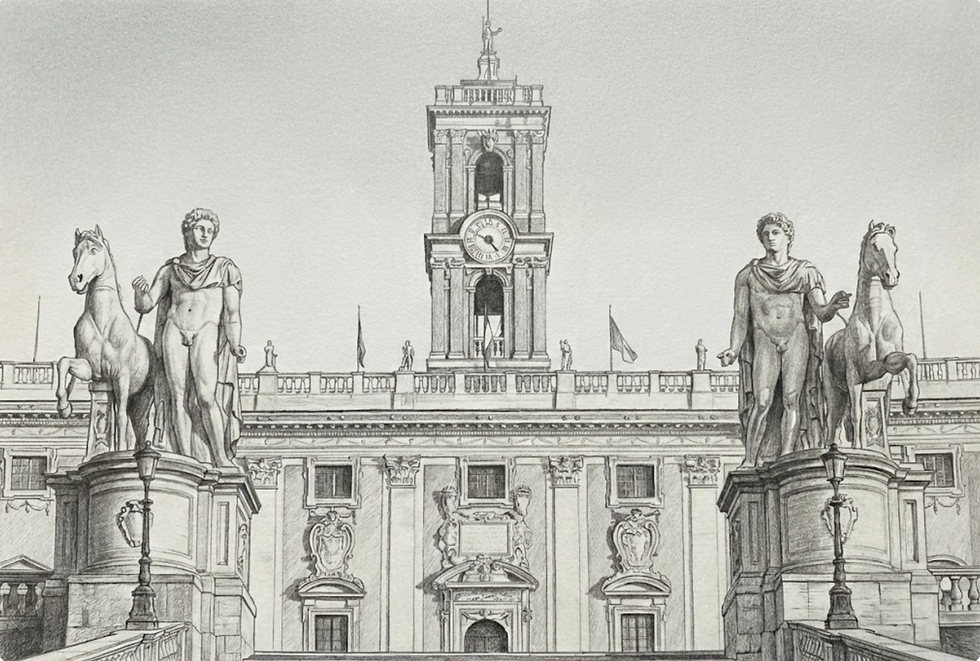Q. Caecilius Metellus supporter of Sulla
- sulla80

- Sep 6, 2020
- 3 min read
Updated: Aug 23, 2021

This denarius, gives me a reason to return to the story of Sulla and the War with Mithridates VI of Pontus. After hastily wrapping up with Mithridates, Sulla began his return to Rome (related post here). During his absence from Rome, Sulla had been exiled as an enemy of the state by Marius, however he still had allies and supporters.
Q. Caecilius Metellus Pius joined Sulla with troops in 83 BC. He was cousin to Sulla's wife Caecilia Metella - their fathers were brothers. Political lines between the elder Metellus and Marius had been drawn by events surrounding war with Numidia.
In three days he (Marius) crossed the sea with a favouring wind, and was at once welcomed gladly by the populace (of Rome), and after being introduced to the assembly by one of the tribunes, he first made many slanderous charges against Metellus, and then asked for the consulship, promising that he would either kill Jugurtha or take him alive. - Plutarch, Lives, Marius 8.5

Q. Caecilius Metellus Pius, 81 BC, AR Denarius, North Italian mint
Obv: Diademed head of Pietas right, wearing earring; stork before
Rev: IMPER in exergue, jug and lituus within laurel-wreath
Ref: Crawford 374/2; Sydenham 751; Caecilia 44
Further, the elder Metellus was later banished from Rome by the efforts of Marius in 100 BC. The son, Q. Caecilius Metellus, earned his name "Pius" for his efforts, eventually successful, to return his father to Rome in 98 BC with help from Quintus Calidius. In 84 BC, while Sulla was fighting Mithridates, Q. Caecilius Metellus Pius was driven out of Italy by the Marians. He returned to Italy in late 84 and joined Sulla on the Appian Way.
In the spring of 83 Sulla’s fleet set out for Italy, sailing in two divisions. The first of these came ashore at Tarentum (Taranto) and the second at Brundisium (Brindisi). The signs, both human and divine, seemed to foretell a swift victory. The Brundisians, who might have opposed Sulla’s landing, instead opened their gates to his troops and welcomes them, won over, like so many other Italians, by his promise to respect their newly acquired rights.
- Arthus Keaverney, Sulla the Last Republican, 2005, p.108
There is no shortage of books written on this period. The final battle of Sulla’s return or of the "Second Civil War", was the Battle at the Colline Gate, fought on the first day of the month (kalends) in November 82 BC. Velleius gives an account, as does Appian. It must have been a gruesome scene in Rome with some 50,000 dead, severed heads on display on spears in the Forum. 8000 prisoners taken and then murdered on Sulla's orders. According to Appian, Sulla had the severed head of Marius the Younger, consul in 82 and son of his rival, displayed in the forum, mocking the dead man with a line from Aristophanes: “first learn to row, before you try to steer”.
This coin took a long break on a post-office shelf, forgotten after a business trip. I caught it the day before it was about the be returned to sender. The old French tag shown below, arrived with the coin.

Roberta Stewart (1997) in "The Jug and Lituus on Roman Republican Coin Types: Ritual Symbols and Political Power", provides an overview of all RR coins with these symbols, the earliest being Sulla, Crawford 359. She makes a compelling argument for me that, when command could be questioned, "Symbols of the augury and sacrificial rituals invoked the traditional religious sanctions of political power and represented the commander’s right to command, most immediately to his army."
This coin with an elephant, the symbol of the Metellus family was issued at the same time.

Q. Caecilius Metellus Pius, 81 BC, AR Denarius, North Italian mint
Obv: Diademed head of Pietas right; to right, stork standing right
Rev: QCMPI Elephant walking left
Ref: Crawford 374/1; Sydenham 750; Caecilia 43
The reverse recalls the capture of somewhere between 60 and 142 of Hasdrubal's war elephants by L. Caecilius Metellus in 251 BC in the First Punic War as the Carthaginians attempted to recapture Panormus (Palermo, Sicily). Polybius tells the story here. It would take another 10 years to get to a peace treaty - and that didn't last long before The Second Punic War, with another Hasdrubal and of course Hannibal crossing the alps with more elephants.




Comments